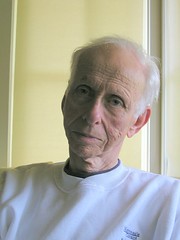Tuesday, April 26, 2005
George Leonard
The environment is pushing us in the direction of all thinking alike. The SAT's five-paragraph essay is an example. So is the grammar checker in MS Word. George is an accomplished author and former magazine reporter yet Word continually tells him he's wrong.
 We all have the potential for genius within us. He and Mike Murphy take this as an article of faith.
We all have the potential for genius within us. He and Mike Murphy take this as an article of faith.Most of George's learning has occurred outside of school. "Learning has been my whole life," he told me, eyes gleaming. Encouraged by his parents, George collected reptiles, did the ham radio thing, had a room for his chem lab, studied modern American literature, played the clarinet (after hearing Benny Goodman on the radio), and formed his own swing band, all before turning 18.
Summers when he was 13, 14, and 15, George and his brother Ed, five years older, would repair to the front porch after breakfast, where Ed would teach George everything he had learned in school, including taking the tests. Faulkner, Dos Passos, psychology, whatever. Unlike teachers at school, Ed was excited and enthused; he trusted George to understand, and that he did. This is the way it should be: the student is a free learner who decides where he should go, what he should learn.
School forgets that the body contains millions of feedback circuits. Centering -- it changes everything. The stillness of meditation.
George has been studying Aikido since the late 70s, and his skills are still improving. He has recently come up with a new genre that involves seeing things from the opponent's point of view. He'll soon be taping a video of it.
One day Mike Murphy and George were brainstorming, writing ideas on slips of paper and letting them fall to the floor as new ideas arose. This was the time of the Free Speech Movement and the Women's Liberation Movement. George said "Human Potential Movement. After three or four years, they tried to bury the term. They discovered it is much harder to unname something than to name it.
While a very accomplished man, George is a soft spoken, unassuming, easy fellow to talk with.
How to learn? Stay open to possibilities. The world is feeding you opportunities all the time. Keep your eyes open and you will see them.
You need instruction to get the basics, but after that, watch closely and see what works. Don't try to change everything at once -- that doesn't work.
Learn from accidents. Learn from mistakes. Capitalize on them. Celebrate the unexpected.
George is getting on in years but he still learns all the time. His piano is improving. He brought up dishwashing. He reflects on the sequence of steps. He seeks to be efficient. He moves several things at a time toward the sink. He probably wastes fewer steps than any dishwasher on earth. This reminds me of Ellen Langer's suggestion that we should perform everything in life as if it were art. And of course, there's the Buddhist maxim that if you're going to wash the dishes, wash the dishes.
I'm going to dig back into Education and Ecstacy for more lessons.
The Mastery Curve
There's really no way around it. Learning any new skill involves relatively brief spurts of progress, each of which is followed by a slight decline to a plateau somewhat higher in most cases than that which preceded it:
To take the master's journey, you have to practice diligently, striving to hone your skills, to attain new levels of competence. But while doing so - and this is the inexorable fact of the journey - you also have to be willing to spend most of your time on a plateau, to keep practicing even when you seem to be getting nowhere.
How do you best move toward mastery? To put it simply, you practice diligently, but you practice primarily for the sake of the practice itself. Rather than being frustrated while on the plateau, you learn to appreciate and enjoy it just as much as you do the upward surges.
